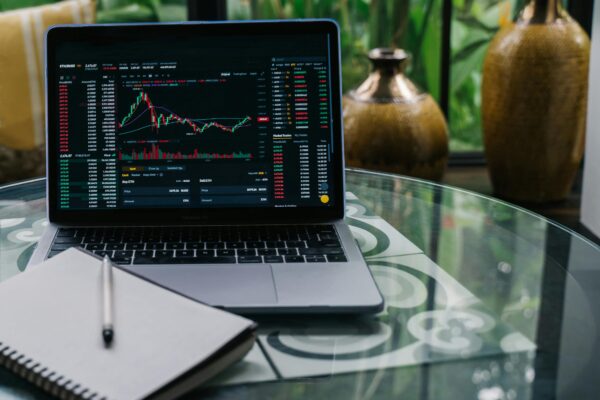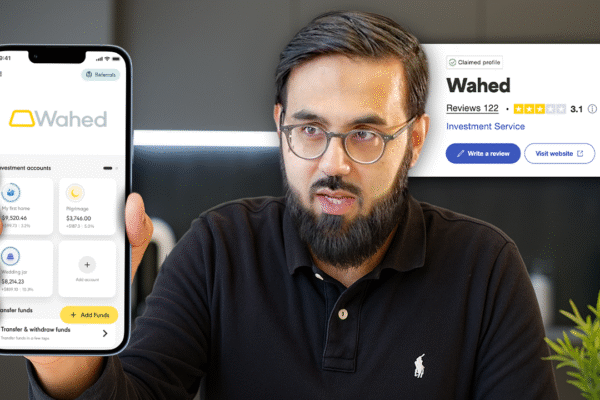
Is the S&P 500 Halal? A Guide for Muslim Investors
26 August 2025 7 min read


Adil Hussain
Head of Content
14 min read
Last updated on:
Exchange traded funds (ETFs) are one of the most popular ways to invest in the stock market. Moreover they have long been hailed as one of the best options for the average investor.
Warren Buffet famously outperformed a hedge fund over 10 years by simply buying an ETF and holding it. In contrast the hedge fund would regularly buy and sell investments. Tales like these illustrate why ETFs are all the rage.
In this article we will cover ETFs blow-by-blow, including a list of all the Halal ETFs in one place.
Exchange-traded funds (ETFs) are funds traded on a stock exchange (such as the Nasdaq or the London Stock Exchange). A fund consists of a pool of money from various investors allocated for a specific investing purpose. This purpose can range from:
As ETFs are traded openly on exchanges they are more accessible to investors than regular funds. Combined with the fact that you get exposure to many different companies, it is easy to see why they are recommended as an easy convenient choice for most investors. More on this later.
This depends on what the fund consists of. The easiest way to find this out is to look for ETFs that have been certified as sharia-complaint by scholars. Otherwise you’d have to do a manual check.
When doing a manual check, you firstly make sure that the ETF actually holds the underlying assets. ETFs that synthetically create the same effect using derivative instruments are not permissible to invest in.
You then need to determine whether all the companies or assets in a fund are halal. If so, then yes the entire ETF is halal.
For more detail on the screening criteria for companies, we have a stock screening article and halal stock screener course that goes into more detail and breaks down each step of the process. We also offer Cur8, a platform offering pre-vetted investment options.
If the fund contains a small number of non-compliant companies or assets (less than 5%), then the ETF is still halal to invest in but you should purify your profits by giving that % away in charity.
In practice, it is quite difficult for the average investor to manually screen a stocks and shares ETF. This is because ETFs generally tend to have anywhere from 30 to hundreds of different active holdings. For this reason, it might be best to stick to the certified halal ETFs. At least until some automated solution can be developed that can speed up the screening process.
Let’s take a look at some of the pros and cons of investing in ETFs.
So in short, investing in ETFs is a great low-cost, low-effort way to gain exposure into specific themes. However there is the potential to make more through picking stocks yourselves. With all this in mind, let’s look at who ETFs are good for.
DIY stock picking is difficult and can be time-consuming to learn the ropes. ETFs can be a great way to get started investing. You can then take your time to learn about DIY stock investing if you so desire.
However don’t expect guaranteed returns. Whilst it is true that in general, many ETFs have performed well in the long term it doesn’t mean this will continue. So doing your due diligence and understanding the risks is still important!
A crucial mistake beginners make is getting spooked by market crashes and selling everything. This usually means they lock in their losses and tend to miss the recovery. Having an investment strategy is crucial for success. We will cover some strategies later.
ETFs have historically performed better over the long-term, similar to most investments. ETFs generally track a group of companies. This means for short-term large spikes in the price, you would need the price to spike for a significant proportion of those companies. This rarely happens. What tends to happen is for companies’ share prices to increase steadily over time.
Whilst it is rare for the price of an ETF to spike suddenly, they can crash heavily in a day. This can happen when there is a market wide crash that affects a large proportion of the ETF’s holdings. This means that for most people, ETFs are best suited for long-term investing.
Similarly to funds, ETFs have a net asset value (NAV), which gives you the value of the fund when you take all its assets and subtract its liabilities. This can be found on the issuer’s website.
You want to compare the net asset value per share with the share price. If there’s a mismatch then this could be quite informative. If the share price is larger than the NAV then this is a good indicator that the ETF may be overvalued.
Conversely if the share price is less than the NAV, this could be an indicator of it being undervalued. You should also look deeper to understand why there is such a deviation in the first place.
For ETFs that track an index, a tracking error between the two prices is common. You just need to make sure it’s not excessive.
When comparing ETFs, do take into account the fees they charge. Ideally you would look at both the current share price and the fees.
As ETFs tend to be more passively managed than normal funds, they usually charge less fees. There are two main fee types you want to look out for.
The tax treatment of ETFs will be the same as it is for stocks and shares.
For UK investors, this means you could potentially be subject to capital gains tax or dividend tax. You’d incur a capital gains tax if you sell your ETF for a profit larger than your capital gains tax allowance for the year. The dividend tax is levied on any dividends received over your annual dividend allowance.
However, if you buy an ETF in an ISA (individual savings account) or SIPP (self-invested personal pension) then neither tax will apply no matter the amount of profit or dividends you make. So always try to make use of an ISA or SIPP where possible!
There are a number of things to consider when searching for ETFs to invest in.
Firstly, you need to understand your own investing goals. Have a plan for what you want to achieve and only invest what you can afford to.
Understanding your own risk profile is also key. Ask yourself whether you would be comfortable investing in high-risk high-reward investments, where drawdowns of over 30% are quite common. You may be better suited to more stable investments that aim for around 8-10% a year. In general, not investing in line with your risk tolerance can lead to poor investment decisions.
For example, in the case where you don’t have a high risk tolerance. If you invest in a high risk asset which suddenly drops 30%. You may panic and sell and then miss the 70% gain it might make over the next year.
Then, it is just a matter of using this information to decide what types of investments you want to make. You may want to focus on certain high growth areas, such as clean energy or emerging markets. Or you might just want to keep things simple and invest in funds that track an index.
Dividends are an important feature for many investors. These are cash payments companies pay out to their investors from their profits. Some ETFs will definitely have dividend-generating assets.
ETFs have two options for dealing with dividends:
To find out how an ETF deals with dividends, either check its full title or the issuer’s website. ETFs that reinvest dividends tend to have ‘Acc.’ in the name. ETFs that pays out dividends have either ‘Inc’ or ‘Dist.’ in their name.
ETFs are generally known for being passively managed. However recently actively managed ETFs have become more popular. The most famous example are the ARK ETFs managed by Cathie Wood. She actively picks stocks to invest in that tie in with her investing theme of disruptive innovation.
However with this comes higher fees as the fund manager has a greater involvement. Another thing to keep in mind is that many active ETFs are US-listed and are inaccessible to UK investors for the most part.
Sukuks are a sharia-compliant alternative to conventional bond products. In a nutshell, Sukuk represent an ownership interest in a pool of assets. These assets generate revenue which are distributed to the Sukuk holders. For more information on Sukuk, check out our deep dive here and our fixed income investing guide here.
2020 saw the release of the first ever Sukuk ETF, a huge development in this space. To date, this looks to be the only Sukuk ETF available. One to keep an eye on for the future.
Real Estate Investment Trusts (REITs) are trusts that hold real estate from which they earn rental returns. A REIT ETF is just a REIT that is also listed on a stock exchange, which makes it easier to trade. Otherwise you would have to access a REIT from a regular fund which isn’t as accessible to the ordinary investor.
Similarly to Sukuk, there are not a great deal of options available in this space. Another one to watch for the future!
Whilst investing in ETFs is a lot simpler than investing in stocks yourself, there are still a few different ways to invest in them.
This is the simplest strategy. Simply invest and hold for the long-term.
A great way to supplement this strategy is to continue to invest. Many investors adopt the dollar cost averaging approach. In this approach, you invest a certain amount every period regardless of the most recent price.
For example you might invest an additional £100 every month out of your pay-check. This allows you to not worry about trying to time the market. Buying regularly will naturally capture any spikes or dips in price, resulting in a smoothed out average purchase price.
This is a great way to take emotion and the latest market hype out of the decision process.
In this approach, investors invest mainly in ETFs and then supplement with other assets, such as stocks.
For example, let’s take a look at Musa. He has 75% of his portfolio in sharia-compliant ETFs. He allocates the remaining 25% to investing in individual stocks. This approach allows him to manage his risk and also be able to invest in individual stocks targeting higher returns.
If he doesn’t want to go down the individual stock route then he could instead invest in actively managed funds that target a higher return than ETFs.
Do your due diligence when searching for actively managed funds. Many claim to be able to offer better returns than ETFs but you want to see proof of this via their historic return.
Whilst past performance doesn’t necessarily promise future reward, it could be a good sign that the fund manager knows what they are doing.
For ideas of other areas of investing to supplement your ETFs, check out our halal investment comparison engine.
One of the most difficult parts of investing is knowing when to sell. The answer for this will depend on each individual investor. Only you are aware of what your investing goals are.
Generally speaking, you should only invest money that you don’t need right now. If however you come into a situation where you require money then yes this would be an appropriate time to sell.
Otherwise the best way to know when to sell is to have a good understanding of why you bought an ETF in the first place. If the reason you bought is no longer valid, then this is a good sign that perhaps it is time to sell.
However if your thesis remains intact and you don’t need the money then why sell? If the urge to sell is unbearable, then a suitable compromise perhaps would be to trim a small amount of your holding, so you can lock in some profits but crucially still remain invested for the long run.
This guide wouldn’t be complete without a word on how exactly to buy ETFs. You buy ETFs the same way you would buy stocks and shares.
Here is a list of sharia-certified ETFs to get you started. Please note, that not all of these may be available in your region. Also make sure to do your own due diligence! We have not reviewed all of these from an investing perspective. This list has just been collated to hopefully make your lives easier.
So what are the alternatives to ETF investing and how do they differ?
This is where you go it alone and find stocks yourself. The potential for reward is greater here but so is the risk. It will also take a lot of time to learn the ropes and to actively manage your investments.
A good halfway option is to use halal stock screeners, such as Zoya and others. This allows you to gain access to pre-vetted, sharia-compliant stocks in a relatively risk-controlled way that you couldn’t otherwise access.
An alternative is to sit our halal stock screening course where we teach you how to sharia screen individual stocks. The advantage of this is that you won’t need to be dependent on anyone else’s assessments and can a judgement call yourself.
You could skip index ETFs and just go straight to index funds. They also track the performance of certain indexes. The main difference is that these are not listed on exchanges. Therefore you can’t buy and sell at any point during market opening hours. You would have to wait for a set point in the day where you could cash out.
These are the actively managed, non-exchange listed options. So similarly to index funds you can’t buy and sell as easily as you could for ETFs. With this option you are essentially paying for the fund manager’s expertise and banking on them to outperform the ETFs.
An investment trust is very similar to a fund. It also pools money from many investors to invest in a basket of various assets. They are also actively managed similarly to mutual funds. The difference is they are structured as companies which then list on stock exchanges. As they are exchange listed, you can buy and sell them the same way you would with ETFs.
So there we have it. Sharia-compliant ETFs are a great option for investors who either don’t have the desire or the time to individually analyse stocks.
If you’re a hands-on investor who wants to go it alone, ETFs can still be a useful way to gain exposure into different sectors. Particularly if you are interested in areas of the stock market that may be inaccessible to an individual investor, such as foreign markets.
If you want to learn more about other areas of investing, check our Halal Investing 101 Guides and halal stock screener course. If you’d prefer to move straight into investing, be sure to check out Cur8's selection of pre-vetted options.

26 August 2025 7 min read

24 July 2025 15 min read

16 July 2025 5 min read
A.T.
7 months ago
Selam akhi, how to invest in SPUS ( halal S&P 500) from Bosnia ? Is this the best halal ETF ?